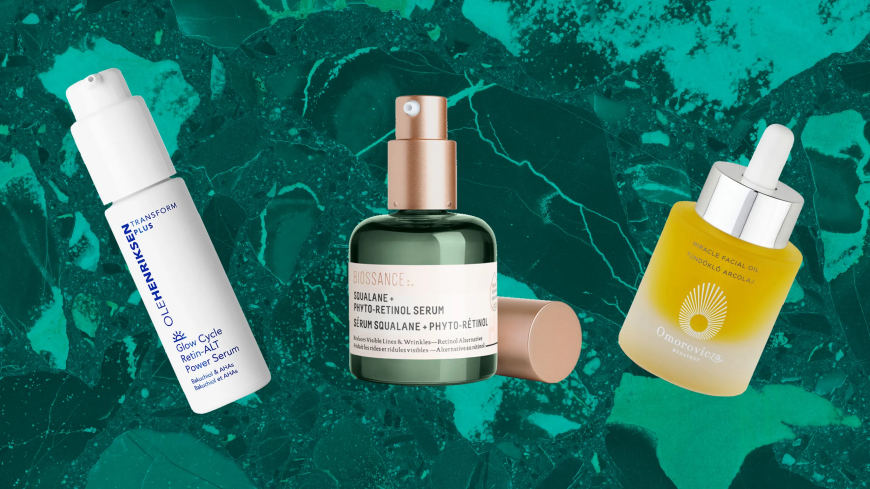Retinol vs. Bakuchiol: Which One Is Better for Anti-Aging?
Retinol vs. Bakuchiol – which is better for anti-aging? Learn the key differences, benefits, and best products for your skin.

Introduction
When it comes to anti-aging skincare, retinol has long been hailed as the gold standard. But in recent years, bakuchiol—a plant-based alternative—has emerged as a gentler option. Both claim to reduce wrinkles, boost collagen, and improve skin texture, but which one is better for your skin?
In this article, we break down the key differences between retinol and bakuchiol, their benefits, side effects, and which one suits your skincare needs.
What Is Retinol?
Retinol is a derivative of Vitamin A and is part of the larger family of retinoids. It works by increasing cell turnover, stimulating collagen production, and improving skin texture. Dermatologists have recommended retinol for decades due to its proven ability to reduce fine lines, wrinkles, and hyperpigmentation.
How Retinol Works:
- Speeds up cell renewal, revealing fresher skin.
- Boosts collagen production, reducing sagging.
- Helps fade dark spots and acne scars.
- Unclogs pores and prevents breakouts.
Best for: Aging skin, acne-prone skin, hyperpigmentation.
Potential Side Effects of Retinol:
- Redness and irritation, especially for sensitive skin.
- Dryness and peeling in the initial weeks of use.
- Increased sun sensitivity (always wear SPF).
Read more on retinoid benefits from the American Academy of Dermatology.
What Is Bakuchiol?
Bakuchiol is a plant-derived compound extracted from the Psoralea corylifolia (Babchi) plant. It has gained popularity as a natural, gentler alternative to retinol. Unlike retinol, bakuchiol is not a vitamin A derivative, but studies have shown that it provides similar anti-aging benefits.
How Bakuchiol Works:
- Boosts collagen production, improving skin firmness.
- Reduces fine lines and wrinkles without irritation.
- Provides antioxidant protection against environmental damage.
- Helps calm inflammation, making it ideal for sensitive skin.
Best for: Sensitive skin, dry skin, and those who can’t tolerate retinol.
Potential Side Effects of Bakuchiol:
- Generally well-tolerated with minimal irritation.
- Not as extensively studied as retinol.
- May not be as potent for severe wrinkles.
Retinol vs. Bakuchiol: A Side-by-Side Comparison
| Feature | Retinol | Bakuchiol |
|---|---|---|
| Origin | Synthetic (Vitamin A derivative) | Natural (Plant-based) |
| Anti-Aging Effects | Clinically proven to reduce wrinkles and fine lines | Provides similar benefits with less irritation |
| Skin Tolerance | Can cause redness, peeling, and dryness | Gentle and well-suited for sensitive skin |
| Sun Sensitivity | Increases sensitivity; requires SPF | Does not make skin more sun-sensitive |
| Usage Recommendation | Nighttime only | Can be used morning and night |
Which One Should You Choose?
The choice between retinol and bakuchiol depends on your skin type and tolerance levels.
- Choose Retinol If: You have moderate to severe wrinkles, sun damage, or acne-prone skin and can tolerate stronger actives.
- Choose Bakuchiol If: You have sensitive skin, rosacea, or prefer a natural skincare approach with minimal side effects.
For best results, always start with a low concentration and gradually increase frequency as your skin adapts.
Can You Use Retinol and Bakuchiol Together?
Yes! Some dermatologists suggest that using retinol and bakuchiol together can enhance anti-aging effects while reducing irritation. Bakuchiol can help buffer the harsh effects of retinol, making it more tolerable for sensitive skin.
For a layered routine:
- Apply bakuchiol in the morning for antioxidant protection.
- Use retinol at night to promote cell turnover.
- Always follow up with sunscreen during the day.
Read expert recommendations on combining active ingredients from Healthline.
Best Retinol and Bakuchiol Products
If you're looking to add retinol or bakuchiol to your skincare routine, here are some top-rated options:
Best Retinol Products:
- The Ordinary Retinol 0.5% in Squalane (Buy here)
- Neutrogena Rapid Wrinkle Repair Night Moisturizer (Check it out)
- Paula’s Choice Clinical 1% Retinol Treatment (Explore more)
Best Bakuchiol Products:
- Herbivore Bakuchiol Retinol Alternative Serum (Buy here)
- Biossance Squalane + Phyto-Retinol Serum (Check it out)
- Ole Henriksen Wrinkle Blur Bakuchiol Eye Gel Crème (Explore more)
Final Verdict
Retinol remains the most researched and effective anti-aging ingredient, but it can be harsh on some skin types. Bakuchiol offers a gentler alternative with comparable benefits, making it a great choice for those who struggle with retinol sensitivity.
If you’re just starting out or have sensitive skin, bakuchiol is worth trying. But if you want the most potent anti-aging treatment and can handle it, retinol is still the best option.
For a balanced approach, you can also consider alternating between the two to get the best of both worlds!
For more expert-backed skincare tips, check out this guide on how to build the perfect skincare routine.
What's Your Reaction?
 Like
0
Like
0
 Dislike
0
Dislike
0
 Love
0
Love
0
 Funny
0
Funny
0
 Angry
0
Angry
0
 Sad
0
Sad
0
 Wow
0
Wow
0



















































